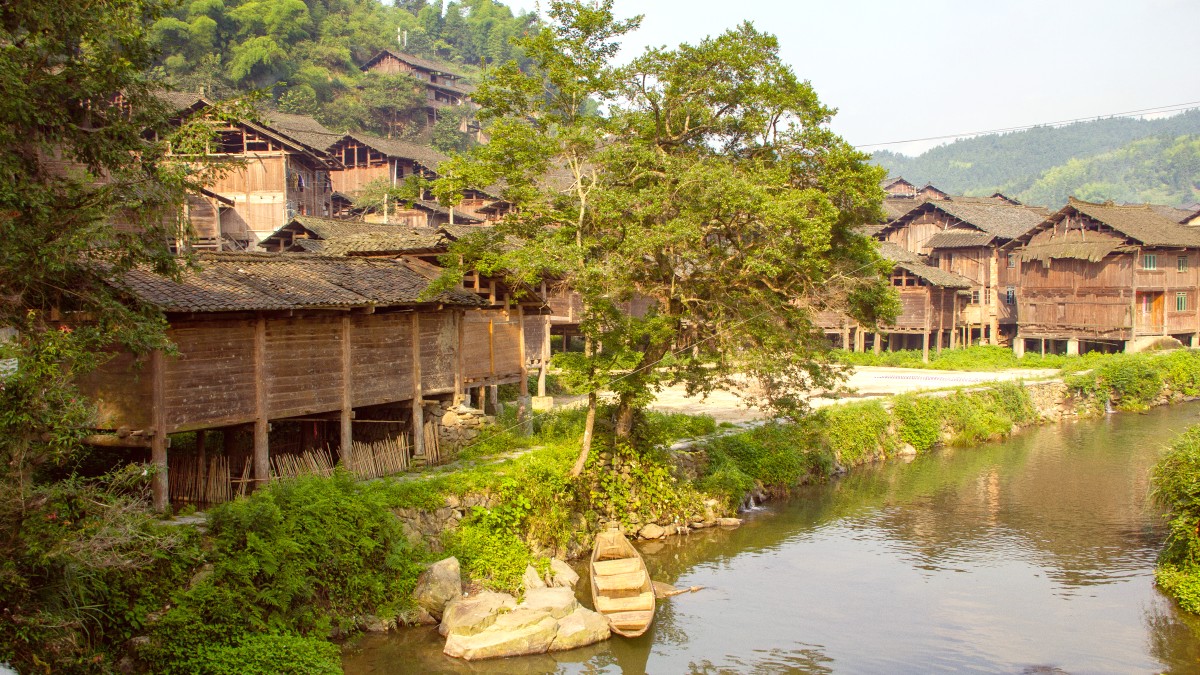
Guizhou, China
Temperatures stay mild in spring, averaging 15-20°C (59-68°F). However, spring often brings cloudy and rainy days, with high humidity. Summer (June-August) brings warm to hot temperatures, averaging 23-28°C (73-82°F). High humidity and frequent rain characterize this season.
Autumn (September-November) sees pleasant temperatures, averaging 18-24°C (64-75°F). Rainfall happens less frequently than in summer. Fog can occur, specifically in the mornings, lending a misty atmosphere to the mountainous landscape. Winters (December-February) stay mild, with temperatures averaging 5-10°C (41-50°F). The weather often presents as damp, cloudy, and sometimes foggy.
Guiyang is famous for high humidity and frequent overcast days. A local saying describes it as "Sunny days in Guiyang are as rare as a frog's hair." This means travelers should always prepare for rain, regardless of the season.
Carrying a Compact umbrella or a Lightweight waterproof jacket stands as a good practice. The humidity makes temperatures feel more extreme, so dressing in layers helps manage comfort.
June-August & Early October
Summer offers warmer conditions, good for exploring parks and natural landscapes.
Higher humidity and more rain in summer. Crowds are larger, especially during public holidays, with increased prices for accommodation and transportation. Booking well in advance is advisable.
April-May & Sep-Nov (excluding early Oct)
Pleasant temperatures, fewer crowds than in high season. This period suits outdoor activities and cultural exploration, balancing good weather and reasonable prices.
Rain can still occur, especially in spring. Fog might occur in autumn, potentially obscuring scenic views.
December-March
Fewer tourists yield lower prices for hotels and flights. Experience a more authentic local atmosphere without crowds.
The weather is cold, damp, and often overcast. Some outdoor activities might offer less enjoyment due to the chill and mist.
For hiking and park visits, spring (April-May) and autumn (September-November) bring the most comfortable temperatures and lighter rain. These seasons suit exploration of Qianling Park, Huaxi Park, or the surrounding natural landscapes.
Museums and historical sites stay open for enjoyment all year. However, the shoulder seasons offer a more pleasant overall experience for moving between indoor and outdoor attractions.
Spring and Autumn for pleasant walks.
Spring and Autumn are ideal for outdoor enjoyment.
Anytime, but shoulder seasons provide a better overall experience.
Winter or shoulder seasons, avoiding major Golden Week holidays (early May and early October) and Chinese New Year.
Evening visits for illumination are stunning year-round.
Most foreign nationals need a visa to enter mainland China. Initiate this process well in advance of your travel dates.
China offers several visa types based on your travel purpose.
Submit your application form, passport, recent photos, and supporting documents to a Chinese embassy or consulate. Allow 1-2 months for processing.
This section details cost breakdowns for various travel styles, currency information, and smart money-saving practices specific to Guiyang.
| Currency | Symbol | Denominations |
|---|---|---|
| Chinese Yuan (CNY) / Renminbi (RMB) | ¥ or 元 | Banknotes: ¥1, ¥5, ¥10, ¥20, ¥50, ¥100. Coins: ¥0.1, ¥0.5, ¥1. |
| Exchange Points | Major banks (Bank of China), airport exchange counters, large hotels. | ATMs are widely available; notify your bank of travel plans. |
| Digital Payments | WeChat Pay and Alipay dominate payments. | Link foreign credit cards to apps for seamless transactions. |
This section covers recommended vaccinations, common health issues, access to medical services, and safety advice.
Always check official sources like CDC, WHO, or your national health authority for current requirements.
Routine vaccinations, Hepatitis A & B, Typhoid. Japanese Encephalitis or Rabies for specific rural exposures.
Discussion with a healthcare professional guides appropriate vaccine choices for your trip.
health issues and how to avoid them.
Gastrointestinal issues ("Traveler's diarrhea") can occur. Drink only Bottled water or boiled water. Eat well-cooked food and practice good hand hygiene. Guiyang generally holds better air quality than many other major Chinese cities, but pollution levels can fluctuate; an air quality index (AQI) app assists.
Summer months bring warmth and humidity. Stay hydrated with ample water. Wear light, breathable clothing. Avoid strenuous activity during peak heat hours. A Travel first aid kit with basic medications and Hand sanitizer is useful.
Always prioritize personal hygiene to lessen health risks.
Guiyang has several general hospitals. Larger public hospitals often feature "VIP" or "International" sections with English-speaking staff. Guizhou Provincial People's Hospital or Guiyang Medical College Affiliated Hospital are examples.
Dial 120 for ambulance, 110 for police, 119 for fire services.
Widely available. English-speaking staff are rare. Bring a list of generic names for prescription medications.
Guiyang presents itself as a safe city for tourists. Violent crime is rare. Petty crime, like pickpocketing, can occur in crowded tourist areas, busy markets, and on public transport. Practice common sense safety measures.
Guiyang's climate and terrain bring specific natural hazards.
Heavy rainfall, especially during summer monsoon season (June-August), can lead to localized urban flooding. Stay updated on local weather forecasts.
Mountainous terrain and heavy rain contribute to landslides in rural areas of Guizhou province. These are less common within Guiyang city itself.
Guizhou lies in a seismically active region. Major destructive earthquakes are rare in the immediate Guiyang area.